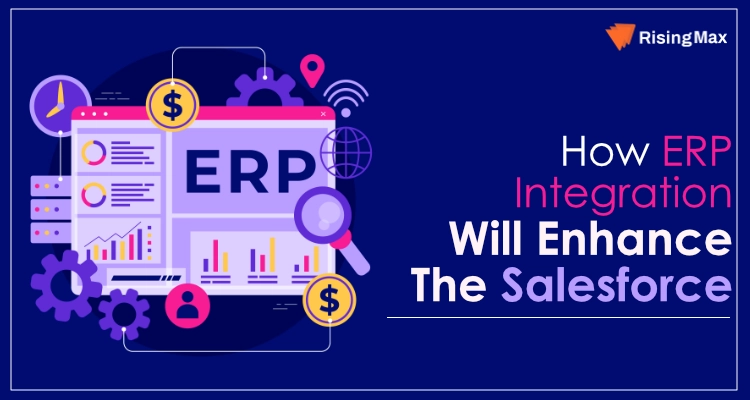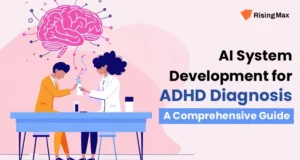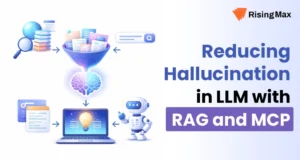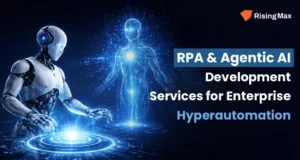In today’s rapidly evolving business landscape, the seamless ERP integration with Salesforce has emerged as a pivotal strategy for organizations striving to optimize their operations and customer relationship management. This salesforce ERP integration facilitates the real-time exchange of critical data, empowering businesses to streamline processes, enhance decision-making, and deliver an unparalleled customer experience.
By aligning the power of ERP’s comprehensive resource management with Salesforce’s robust sales and customer insights, companies can achieve heightened efficiency, reduced data silos, and improved collaboration across departments. This introduction delves into the transformative potential of ERP salesforce integration, exploring its multifaceted benefits and illustrating how this synergy redefines how businesses operate and engage with their clientele.

What Is Salesforce?
Salesforce technology refers to the innovative suite of cloud-based software solutions developed by Salesforce.com. This technology encompasses Customer Relationship Management (CRM) tools, automation, and analytics that empower businesses to enhance customer engagement, streamline operations, and drive growth.
Leveraging the power of cloud computing, Salesforce offers a flexible and scalable platform that enables companies to centralize data, automate processes, and gain actionable insights. With features like artificial intelligence, customizable applications, and seamless integrations, Salesforce technology revolutionizes how organizations manage sales, marketing, customer service, and more, fostering efficiency and agility in today’s dynamic business environment.
What Is Enterprise Resource Planning?
Enterprise Resource Planning (ERP) is a comprehensive software solution designed to streamline and integrate various organizational business processes. It enables efficient management of resources, data, and operations across finance, human resources, manufacturing, and supply chain departments. ERP systems provide a centralized database and real-time visibility, fostering informed decision-making, improved collaboration, and enhanced productivity.
Also Read: Salesforce Appexchange App Development Company
Key Points About ERP
- Process Integration: ERP unifies disparate processes, eliminating data silos and fostering seamless communication across departments.
- Data Centralization: It offers a centralized repository of business data, enabling consistent, accurate, and up-to-date information accessible to authorized users.
- Automation: ERP automates routine tasks and workflows, reducing manual intervention, enhancing efficiency, and minimizing errors.
- Scalability: ERP systems are scalable, accommodating business growth and changes, making them suitable for enterprises of various sizes.
Technologies Used In ERP Development
Modern ERPs leverage a blend of technologies like relational databases (SQL), programming languages (Java, C#), web technologies (HTML5, JavaScript), APIs, and ERP Optimization to facilitate data storage, user interfaces, business logic, and integrations. Cloud computing, AI, and machine learning are also incorporated to enhance ERP systems’ scalability, mobility, analytics, and predictive capabilities.
Integrate your ERP with Salesforce. Streamline operations, elevate insights, and drive growth.
Benefits Of ERP Integration With Salesforce
Seamless Data Flow
ERP Salesforce integration establishes a seamless data flow between back-end operations and customer-facing activities. This ensures consistent and updated information across the organization.
Customer Insights
The integration empowers teams with a comprehensive view of customer interactions. This leads to a better understanding of customer needs, preferences, and behaviors, enhancing engagement and loyalty.
Efficient Order-to-Cash
Integrating order management processes between ERP and Salesforce streamlines the order-to-cash cycle. This reduces manual errors, accelerates order processing, and improves cash flow management.
Optimized Inventory Management
Real-time synchronization between ERP inventory and Salesforce sales data aids in accurate demand forecasting, preventing stockouts, and reducing excess inventory costs.
Data-Driven Decisions
Integration facilitates access to real-time data insights, enabling informed decision-making. This data-driven approach enhances strategic planning and responsiveness to market changes.
Enhanced Productivity
Automated data sharing minimizes redundant data entry, freeing employees’ time to focus on higher-value tasks and ultimately boosting overall productivity.
Improved Customer Service
With integrated systems, customer service teams can instantly access order histories and inventory information, enabling quicker issue resolution and better customer experiences.
Sales Efficiency
Integration ensures that sales teams have the latest product and pricing information, leading to more accurate quotes, faster sales cycles, and improved win rates.
Regulatory Compliance
Integrating ERP’s compliance capabilities with Salesforce’s customer data management helps maintain regulatory standards while managing customer interactions.
Future-Ready Infrastructure
ERP Salesforce integration lays a foundation for incorporating emerging technologies like AI and IoT, fostering innovation and adaptability in a rapidly evolving business landscape.
Also Read: Managed IT Services For Small Businesses
Importance Of ERP Integration With SalesForce
ERP integration with the sales force holds immense importance in modern business operations due to its synergistic benefits. Here’s why the convergence of these two systems is crucial:
Unified Data
Salesforce ERP integration ensures a cohesive and consistent dataset across the organization. This shared data repository enhances accuracy, reduces data duplication, and minimizes discrepancies, leading to reliable insights and better decision-making.
End-to-End Visibility
The integration bridges the gap between front-end sales processes and back-end operations. This enables a holistic view of the entire customer lifecycle, from lead generation and sales to order fulfillment and financial transactions. Such visibility promotes transparency, collaboration, and improved customer service.
Efficient Processes
Integrating ERP’s robust process automation capabilities with Salesforce’s customer-centric approach streamlines workflows. This leads to seamless order processing, optimized inventory management, and efficient resource allocation, contributing to operational excellence.
Enhanced Customer Experience
With integrated systems, customer-facing teams can access comprehensive customer profiles. This empowers them to provide personalized interactions based on historical purchasing behavior, preferences, and order status, leading to superior customer satisfaction.
Informed Decision-Making
The combination of ERP’s analytical capabilities and Salesforce’s sales insights equips decision-makers with real-time, data-driven insights. This enables accurate forecasting, better resource planning, and the agility to respond to market trends promptly.
Scalability and Growth
ERP integration with salesforce prepares businesses for growth by providing a flexible infrastructure that accommodates increased demands. The streamlined operations and improved data accuracy enable smoother scaling without compromising efficiency.
Competitive Edge
In a competitive marketplace, seamless integration between sales, operations, and finance arms businesses with a competitive advantage. This integrated approach allows organizations to respond quickly to market shifts and customer demands.
ERP integration with salesforce transforms businesses into more agile, data-driven, and customer-centric entities. It unifies processes, empowers teams with actionable insights, and enriches the customer journey, ultimately driving business growth and success.

Features of ERP That Will Enhance Salesforce
Enterprise Resource Planning (ERP) systems offer a range of features that streamline business processes and enhance operational efficiency. Here are some key features:
Centralized Data Management
ERP provides a unified database that integrates data from various departments like finance, inventory, human resources, and more. This centralization eliminates data silos and ensures consistency and accuracy of information.
Process Automation
ERP automates repetitive tasks and workflows, reducing manual errors and increasing productivity. This includes automated order processing, invoicing, inventory management, and more.
Real-time Insights
ERP offers real-time reporting and analytics, enabling informed decision-making. Users can access up-to-date information on sales, inventory, financials, and other critical metrics, facilitating quicker responses to changing market conditions.
Supply Chain Management
ERP systems optimize the supply chain by tracking inventory levels, demand forecasting, and managing supplier relationships. This helps maintain optimal inventory levels, reduce costs, and improve delivery times.
Financial Management
ERP includes financial modules for accounting, budgeting, and financial reporting. It streamlines financial processes, tracks expenses, manages budgets, and supports compliance with regulatory requirements.
Human Resources Integration
ERP systems often incorporate HR modules to manage employee information, payroll, attendance, and performance evaluations. This integration enhances workforce management and simplifies payroll processing.
Customer Relationship Management (CRM) Integration
Some ERPs integrate all-in-one CRM functionalities, allowing businesses to manage customer interactions, track sales leads, and improve customer service through a unified platform.
Scalability and Customization
ERP solutions can be tailored to fit the specific needs of different industries and business sizes. They offer scalability as companies grow, accommodating additional users, processes, and functionalities.
Data Security and Compliance
ERP systems prioritize data security by controlling access to sensitive information. They often include features for complying with industry regulations and data protection standards.
Collaboration and Communication
ERP platforms enhance internal collaboration by providing tools for sharing information, documents, and updates across departments. This fosters better communication and teamwork.
Mobile Access
Many modern ERP systems offer mobile applications, allowing users to access essential data and perform tasks remotely. This is particularly useful for employees who work off-site or require on-the-go access.
Vendor and Customer Portals
Some ERPs include self-service portals for vendors and customers. Vendors can track orders and invoices, while customers can place orders and check order statuses, enhancing transparency and customer satisfaction.
How RisingMax Inc. Can Help You In ERP Integration with Salesforce
Certainly, here are 6 points about RisingMax Inc.’s capabilities in ERP integration with Salesforce:
Expertise in Integration
RisingMax Inc. specializes in seamlessly integrating ERP systems with Salesforce, leveraging their deep technical expertise and experience to ensure a smooth and effective integration process.
Customization for Business Needs
RisingMax Inc. understands that every business is unique. They offer tailored solutions, customizing the Salesforce ERP integration to align with each client’s specific processes, data flows, and requirements.
Data Synchronization
RisingMax Inc. excels in synchronizing data between ERP and Salesforce systems. This ensures that accurate, up-to-date information is available on both platforms, enhancing decision-making and reducing data discrepancies.
Real-time Insights
By integrating ERP’s real-time financial and operational data with Salesforce’s customer information, RisingMax Inc. empowers sales teams with comprehensive insights. This enables more informed sales strategies and improved customer interactions.
Efficiency and Productivity
The integration expertise of RisingMax Inc. optimizes workflows and automates processes between ERP and Salesforce. This results in improved efficiency, reduced manual efforts, and streamlined operations for sales and other teams.
Support and Maintenance
Beyond integration, RisingMax Inc. provides ongoing support and maintenance services. This ensures the integrated systems work seamlessly, adapting to technological changes, business processes, and growth.
RisingMax Inc.’s proficiency in Salesforce ERP integration contributes to enhanced data visibility, operational efficiency, and strategic decision-making for businesses seeking a unified and streamlined approach to their processes.
FAQs
How can businesses overcome potential resistance from employees during integration?
Resistance to change is common. Communicating the benefits of integration, providing comprehensive training, and involving employees in planning can help address resistance. Demonstrating how the integration simplifies their tasks and enhances their productivity can encourage buy-in.
What are the initial steps to take when planning ERP integration with Salesforce?
Start by thoroughly assessing your existing systems, processes, and data flows. Identify key integration points and define data mapping requirements. Create a cross-functional team involving IT, sales, finance, and other relevant departments to ensure a comprehensive approach.
How is data security and privacy maintained during integration?
Data security is paramount. RisingMax Inc. ensures that data is encrypted during transmission and storage. Implement role-based access controls to restrict data access only to authorized personnel. Regularly monitor and audit data access to identify and mitigate potential security risks. Compliance with relevant data protection regulations is also crucial.
How does ERP integration enhance the sales process?
ERP integration provides sales teams instant access to customer order histories, product availability, and pricing information. This enables them to provide accurate quotes, recommend complementary products, and manage orders more effectively, resulting in quicker sales cycles and improved customer satisfaction.















